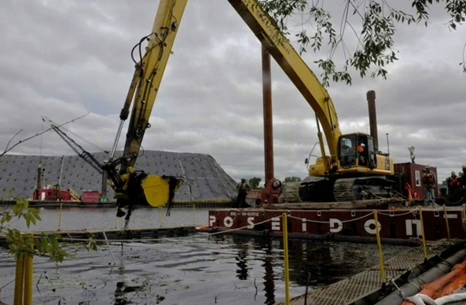It was a big morning at the Elgin County Railway Museum as high-profile guests gathered to welcome German automaker Volkswagen (VW) to St. Thomas.
By 2027, St. Thomas will be home to an enormous electric vehicle (EV) battery manufacturing plant that will span the area of 210 football fields.
“It will be our first gigafactory in North America and it has great potential to become our biggest one in the world,” said Frank Blome, CEO of PowerCo, VW’s battery company. “Gigafactory St. Thomas will have six production blocks with potential of up to 90 gigawatt hours, which is enough for a million electric vehicles a year. The dimensions are enormous in all respects.”
VW has plans to release 25 new EV models by 2030, and Blome says most will be equipped with battery cells made in St. Thomas.
The automaker has reportedly invested $7-billion Canadian dollars in the project, eager to establish VW’s first overseas EV battery manufacturing facility.
“Gigafactory St. Thomas will play a key role in Volkswagen group’s ambitious growth plan within North America,” Blome added.

#VWGroup brings a large cell factory to #Canada:
4.8 billion EUR invest
3,000 highly skilled jobs
production starts in 2027
With Gigafactory St. Thomas, #VWGroup delivers another convincing example for its ambitious growth #strategy in the #NorthAmerican region! pic.twitter.com/dkFQmaGv3z
— Volkswagen Group (@VWGroup) April 21, 2023
The PowerCo CEO was joined by Prime Minister Justin Trudeau and Premier Doug Ford, as well as provincial and federal ministers, and leaders from the city of St. Thomas to celebrate the win for the community.
VW’s new gigafactory will create about 3,000 direct jobs and up to 30,000 indirect jobs for Canadians. François-Philippe Champagne, minister of innovation, science and industry, confirmed that the site will be the single largest manufacturing plant in Canada.
To help secure the deal, the federal government agreed to provide VW with up to $13-billion in subsidies over the next 10 years. However, Trudeau says the investment will more than pay off in the long run.
“It will be worth over $200-billion dollars to the Canadian economy over the coming decades, it will provide millions upon millions of batteries to power Canada’s auto industry, which is one of the engines of our clean economy,” Trudeau said. “The economic impact of this project will be equal to the value of government investment in less than five years. That’s the math that matters.”
Ford stood alongside Trudeau in praising the deal, emphasizing that it’s something all constituents can get behind.
“This is what happens when we work collaboratively together, we put all the political stripes aside. Who cares about the political stripes? This is about the people… these are investments that will benefit the entire community and for generations to come.”
St. Thomas’ history in the automotive manufacturing industry was another factor that appealed to VW. To the people of St. Thomas, Champagne said, “It’s really thanks to your talent, your expertise, and know-how that we were able to attract an investment like this.”
Friday morning’s announcement was attended by high school and post-secondary students from across the region. With construction set to begin in 2024 and the gigafactory opening in 2027, folks entering the workforce in the next few years will be able to reap the benefits of this historic deal.
“This is the future of our community. The thriving community we have right now, one of the fastest growing in Ontario, is only going to get better. The coming years are going to mark some of the most prosperous times this city has ever seen and the region as a whole,” said Sean Dyke, CEO of St. Thomas Economic Development Corporation.
“St. Thomas is on a roll, and has a really bright future. This has guaranteed the future of St. Thomas for decades to come, for lifetimes to come, but we’re not done yet. St. Thomas has a lot more to go,” said Mayor of St. Thomas Joe Preston.
